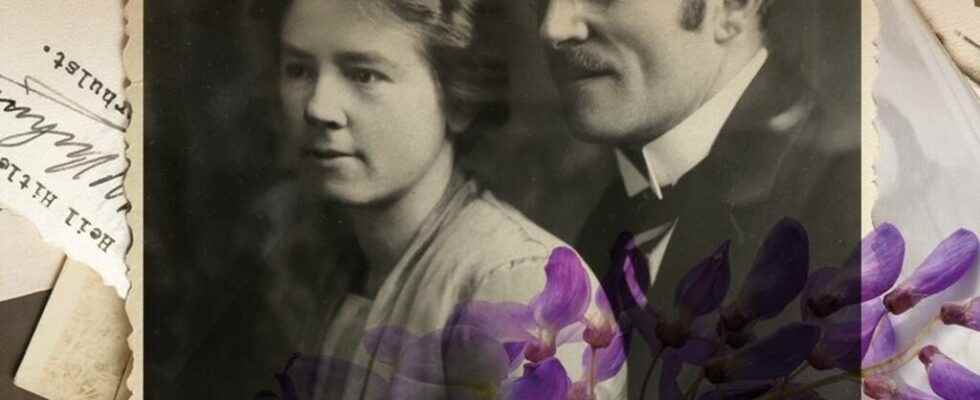Over the course of what his readers now recognize as a trilogy, Stefan Hertmans asserts himself as a major and singular voice in Flemish literature. His latest book recounts the grip that a flamingo militant transformed into a Nazi dignitary exerts on his family that nothing prepared to undergo this ordeal.
” There is no banality of evil, said the Italian Jewish writer Aldo Zargani, breaking up with Hannah Arendt, only those who commit it are commonplace. This would be the lesson we could draw from reading this novel. historicizingas Stefan Hertmans likes to describe it, where, to a long and meticulous exploration of the archives, is added a touch of imagination – some scenes are invented for the needs of the narration – and the fieldwork of a reporter.
” I want to behave like a journalist in my novels repeats the one who, in these last three books, has always started from a place, a house where he lived, that of his grandparents in Ostend in War and turpentinehis residence in France near Mont Ventoux for The converted heart and finally, in this book, the first house he acquired in 1979 ” for the price of a car in Ghent.
Fascism, between ideological void and obsession with resentment
He stayed there for twenty years, vaguely conscious of the smell of sulfur that surrounded him, but initially unwilling to know more, so odious was the character who was still talked about after his death in 1975. and “shabby”. It is a certain Willem Verhulst, a lanky, boastful traveling salesman, whom the arrogance of the Walloons led to espouse what he believes to be the “Flamingant ideal”.
The cause in itself is highly legitimate, in a country where more than two thirds of the population are forced to adopt the language of the French-speaking community, a minority, but more prestigious and richer – things have since changed a lot. But the claim of a cultural identity is replaced by an obsessive hatred of Belgianists (supporters of a united Belgium) and fransquillons (the Flemings who use French).
This resentment, also fueled by a half-blindness which earned him a number of humiliations in his childhood, does not form an ideology. This absence of constructed thought is for Stefan Hertmans the ” real secret of banal fascism – he agrees in this sense with the thesis deployed by Antonio Scurati, in his novel, M, the child of the century(Les Arènes, 2020) which describes Mussolini as “ a hollow man, devoid of ideology “.
Both have in common, in their “ascent”, to have counted on the love of a Jewish woman, who was highly sensitive and intelligent. Elza Meissner is eleven years older than Willem Verhulst. He married her, went to live with her in The Hague, but when she died of cancer in 1926, he remarried a few months later to a Dutch Protestant, Mientje Wijers, whose moral rigor and pacifism had no effect. equal to the alcoholic instability of the husband, his hateful dissimulation and his deceptive joviality.
They will have three children. All his life he kept his two wedding rings, not so much out of fidelity to the deceased wife as out of a morbid taste for double games. In the mid-1930s, he met a third woman, Griet Latomme, who became his mistress and shared his political itinerary.
Under the junk uniform, a zealous genocidaire
The Verhulst family settled in Ghent in 1942, in the famous house of Patershol bought later by the writer. The place is huge, humid, uncomfortable. Unable to use a weapon, Willem Verhulst nevertheless likes to parade in SS uniform, finery which he is asked to shed in the domestic space.
His task is that of an informer, he makes lists of Jews, Freemasons, Communists, in short, of people to be deported. His activities lead him to join Germany in the company of his mistress when the allies enter Belgium, then to try to be forgotten, in vain. He is soon arrested and imprisoned. ” As often happens, remarks Stefan Hermans, it is only once behind bars that the convict really becomes radicalized. »
His wife, who remained faithful to him despite his betrayals, nevertheless obtained his parole in 1953. Six years later, his son Adriaan, a brilliant historian – Stefan Hertmans was to be among his students – the fate of new legal troubles after a particularly violent brawl in a bar. Shortly before his death in 1975, Willem Verhulst asks to join the grave of his first wife, without having denied, far from it, his Nazi convictions.
What the book adds to the evocation of this journey without light is the patient portrait of a family that manages to build itself not so much against him as in spite of him, sanctioning his impotence. It is also what the places tell, and the stages of a research that form the real challenge of the narration, in the way in which the German writer WG Sebald proceeded, a reference constantly evoked by Stefan Hertmans, who makes this book the most beautiful of tributes.
► Stefan Hermans, An Ascent Gallimard, 2022. 23€
►Dby the same author:
– War and turpentine Gallimard Folio, 2017.
– The converted heartGallimard Folio, 2018.
These three books are remarkably translated from Dutch (Belgium) by Isabelle Rosselin.
► To read and listen to on RFI :
– In 2019, Belgian SS veterans still receive a German pension
– Belgium, a carnival with strong anti-Semitic overtones
– [Langues oubliées du Nobel] Who wants Dutch letters?
